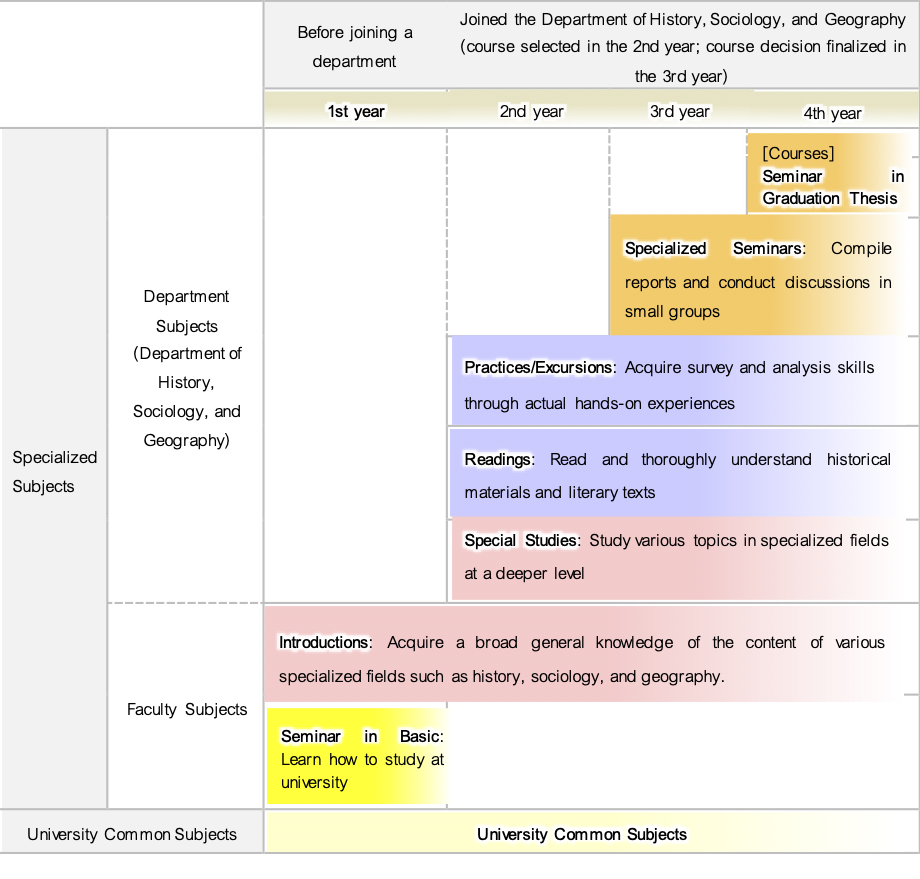Department of History, Sociology, and Geography
Courses of the Department of History, Sociology and Geography
・History Course
Students on the History Course learn about Japanese history, Oriental history, Western history, archeology, and the history of Japanese art, encompassing a diverse range of eras and regions, and the course also covers a wide variety of themes and areas including international cultural exchange, politics, religion, thought, and culture. Basic abilities are fostered, sensitivity cultivated, and flexible thinking skills acquired by small group seminars and the close reading of specialist books, foreign language literature and historical materials such as ancient texts, ancient records, icons, engravings and excavated items. The students go on to write their graduation theses on a theme they are free to choose themselves.
・Geography Course
The Geography Course enables research across a diverse spatial scale covering Nara Prefecture, Japan and overseas and treating themes such as regional natures, society and economy, the creation of cities, town planning, lifestyle and culture, tourism, popular culture, gender, landscapes, environmental issues and natural disasters. Under the guidance of six faculty members, it is possible for students to study and research about physical geography and human geography, as well as regional geography and regional research.
・Sociology Course
Our society is composed of interpersonal links (relationships); the mechanisms (systems/structures) built upon these links; and the media (culture/communications) that sustain or change those mechanisms.
The Sociology Course places its basic focus on these elements with which society is built, and sets the interpretation of the phenomena occurring in contemporary society as its objective. Specifically, the course covers a large variety of themes and areas including globalization and international society, gender and family, urban and rural, disparities and inequality, organizations, networks and communities, culture and media, cultural diversity and cross-cultural encounters.
Students learn the way of thinking and perceiving (theories) requisite for elucidating social phenomena, and methods for concretely investigating what is really happening (research methodology such as questionnaire surveys, fieldwork, interview-based research and the analysis of material and media) thereby instilling them with all these skills.
Message from the Department:Connecting Past and Present, East and West—Approaching Mysteries of History, Space, and Society
Language, the mind, the body….At the Nara Women’s University Faculty of Letters, many flowers of knowledge related to humanity are in full bloom.
In particular, the Department of History, Sociology, and Geography endeavors to explore the worlds of the past-present and East-West in terms of society, connections, spaces, and images. To this end, the Department offers five courses: Studies in Ancient Culture, Historical Studies, Social Information Studies, Regional Environment Studies, and Studies in Cultural Media.
You may ask, “How useful is our study in this department? ” to which we answer: “It will help you live your life.”
You will not only learn how to understand and interpret distant worlds in time and space, but also how to see things right before your eyes that, up until now, you have missed. The training will help solve your everyday problems, and could even save the world.
However, the value of academic study does not lie solely in immediate utility. Why not try spending four enriching years enjoying yourself in the world of cultural knowledge that humans have built up over time, walking through the fields where human activities take place, and exploring the vast horizon of humanity and the world? By the end of your college life, your next step will surely emerge in front of you.
Curriculum Features
“Specialized Subjects” include “Introductions”, “Special Studies”, “Readings”, “Practices”, “Excursions”, “Seminars”, and “Seminars for Graduation Thesis”.
In their first year, students can take “Introductions” that offer a general knowledge of the content of various specialized fields such as history, sociology, and geography. Students are encouraged to take introductory subjects in a diverse range of fields so that they can acquire as broad a range of knowledge as possible.
Beginning in their second year, students undertake “Special Studies” in which they examine more detailed topics in each field; “Readings” in which they explore a thorough selection of historical materials and specialized texts; and “Practices”, and “Excursions”, in which they acquire surveying and analytical skills through hands-on experiences.
In their third year onwards, students take “Specialized Studies” in which they compile reports themselves and conduct discussions in small-class environments that enable them to put their knowledge and skills into practice.
In their fourth year, students take “Seminars for Graduation Thesis” in which they individually decide their own research topic and carry out research to complete their graduation thesis.

Figure: Overview of the Department of History, Sociology and Geography Curriculum
